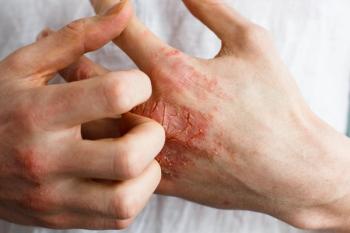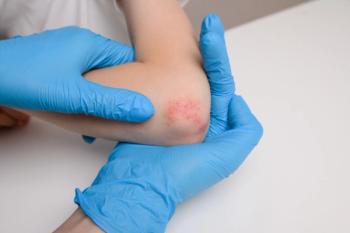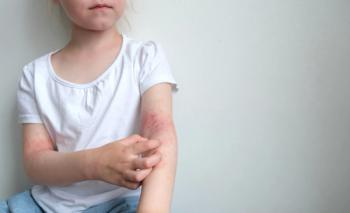
FDA: Roflumilast Cream sNDA Accepted for Atopic Dermatitis
The treatment from Arcutis Biotherapeutics has a Prescription Drug User Fee Act (PDUFA) target action date of July 7, 2024.
The US Food and Drug Administration (FDA) has accepted a Supplemental New Drug Application (sNDA) from Arcutis for roflumilast cream 0.15% for the treatment of atopic dermatitis (AD) in both adults and children as young as 6 years of age.1
With this acceptance, the FDA has also set a Prescription Drug User Fee Act (PDUFA) target action date of July 7, 2024.
“With this filing acceptance, we are one step closer to potentially providing a new topical option for the millions of Americans living with atopic dermatitis. Given the prevalence of this disease in both children and adults, as well as the need for better long-term management, we believe once-daily, steroid-free roflumilast cream has the potential to become the new standard of care in atopic dermatitis,” said Frank Watanabe, president and chief executive officer at Arcutis, in a press release.1 “We look forward to working closely with the FDA during the review process as part of our ongoing efforts to develop topical roflumilast for the treatment of immune-mediated skin diseases.”
The sNDA is supported by positive safety and efficacy data from 3 phase 3 programs, including INTEGUMENT-1 and INTEGUMENT-2, a phase 2 dose-ranging study, and 2 phase 1 studies assessing the pharmokinetics of the drug.
The INTEGUMENT studies, both of which were identical, parallel group, double-blinded, and vehicle-controlled studies, randomized 884 participants to 0.15% roflumilast cream and 453 participants to vehicle cream for once daily treatment.
Patients treated with roflumilast met the primary end point of validated Investigator Global Assessment – Atopic Dermatitis (vIGA-AD) success at a rate much higher than among patients receiving the placebo. 32.0% of patients treated with roflumilast achieved vIGA-AD success compared to a rate of 15.2% in the vehicle control group at week 4 in INTEGUMENT-1. In INTEGUMENT-2, the same held true with 28.9% of patients receiving roflumilast achieving vIGA-AD compared to a rate of 12.0% in the vehicle control group, also at week 4.
Both studies also met a key endpoint of Eczema Area and Severity Index (EASI) reduction, with more than 40% of patients treated with roflumilast achieving a 75% reduction in EASI (EASI-75) by week 4 compared with patients treated with the vehicle control (22% and 19.7% in INTEGUMENT-1 and 2, respectively)
Additionally, more than 30% of patients treated with roflumilast in both INTEGUMENT studies achieved success via the Worst Itch-Numeric Rating Scale (WI-NRS) by week 4. According to the study, improvements were both significant and rapid in nature; some patients achieved significant improvement as early as 24 hours after the first application of roflumilast.
Roflumilast cream 0.15% was well-tolerated in patients with low incidence of treatment-emergent adverse events being low and predominantly mild to moderate in nature. The most common adverse reactions included mild to moderate headache, nausea, application site pain, diarrhea, and vomiting.
“Atopic dermatitis is a chronic and recurring inflammatory skin condition that requires therapy that is effective, tolerable, and suitable for long-term use by both adults and children. Due to its waxing and waning nature, long-term disease control is ideal for the patient versus cyclical treatment, which consists of starting and stopping treatment when skin is controlled and when it is not,” said Lawrence Eichenfield, MD, in a press release from Arcutis.1 Eichenfield is the chief of pediatric and adolescent dermatology at Rady Children's Hospital-San Diego; professor of dermatology and pediatrics; and vice-chair of the Department of Dermatology at UC San Diego School of Medicine. Eichenfield is also a study investigator.
“In clinical trials, roflumilast cream demonstrated rapid and sustained improvement in the signs and symptoms of disease, as well as long-term proactive disease control with twice weekly maintenance dosing. With this profile, patients will not need to make tradeoffs between long-term safety, efficacy, and tolerability," Eichenfield said.1 "Roflumilast cream if approved, has the potential to simplify the approach to disease control for children and adults.”
Reference
1. FDA accepts Arcutis’ supplemental new drug application for roflumilast cream 0.15% for the treatment of atopic dermatitis in adults and children down to age 6. Arcutis Biotherapeutics. November 29, 2023. Accessed November 29, 2023. https://investors.arcutis.com/news-releases/news-release-details/fda-accepts-arcutis-supplemental-new-drug-application
Newsletter
Pharmacy practice is always changing. Stay ahead of the curve with the Drug Topics newsletter and get the latest drug information, industry trends, and patient care tips.























